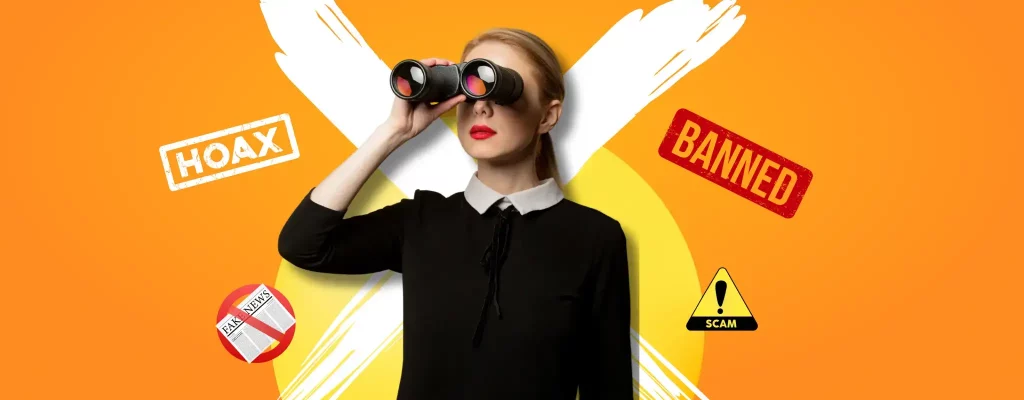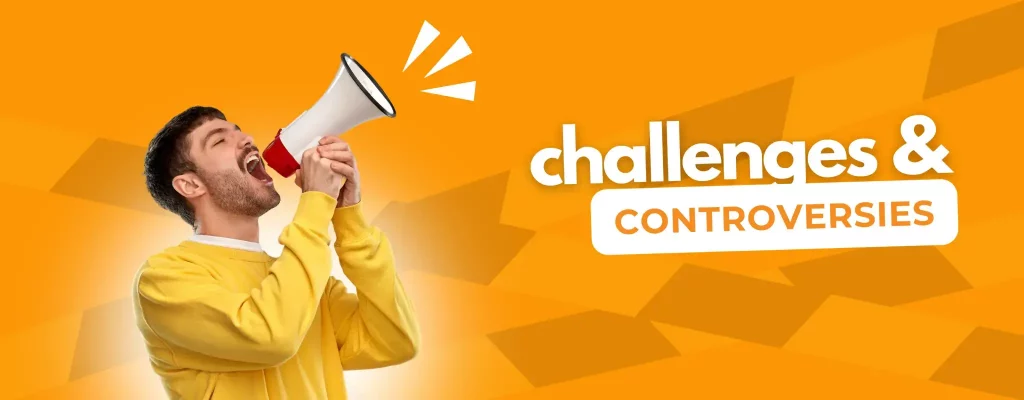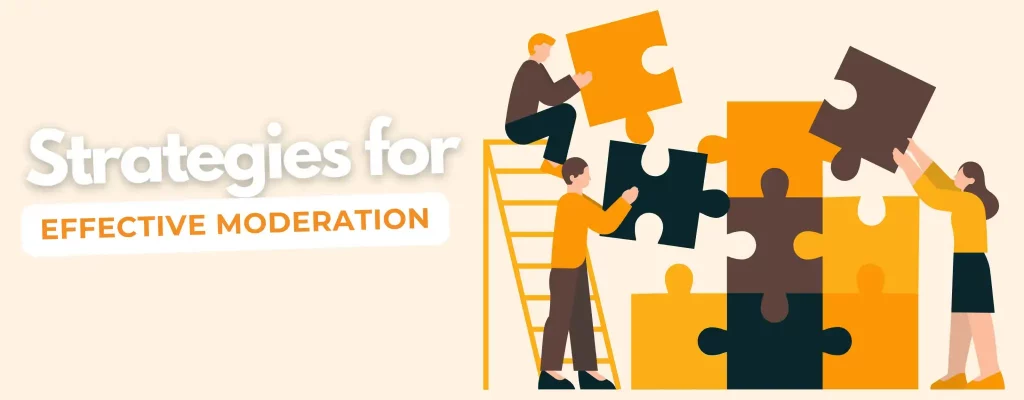The role of a social media moderator in today’s digital landscape is crucial. As more users flock to social media sites to interact, share posts, and express their ideas and opinions, the risk of harmful content on these platforms continues to increase.
The exponential growth of inappropriate online material calls for effective methods to ensure user safety and well-being. Learning how to manage social media content should be prioritized to increase platform awareness and engagement. Thus, social media moderation is a must.
Social media moderation refers to regulating user-generated content (UGC) on social media channels. Unwanted, inappropriate, and poor-quality UGC can negatively affect user experience and damage the platform’s regulation.
But the question is, who does such a meticulous job?
Taking Charge: Who Keeps Social Media Safe?

Social media content moderators are the people behind the scenes, ensuring that what we consume on screen is factual, safe, and high-quality.
They police social media to uphold user and platform safety. They lessen the risk of user exposure to unwanted content, including text, videos, and images. Therefore, they improve the quality of user experience and promote positive digital interactions.
Here is a quick rundown of what is a social media moderator and how they take charge in the social media landscape:
- Reviewing UGC
Social media moderators monitor and review user-generated posts, comments, photos, and videos. They filter content for offensive language, nudity, violence, and disturbing imagery, among other things. After flagging potentially harmful content, social media moderators can remove it or warn the users who upload it. In doing so, they enforce pre-existing policies and guidelines to help uphold online safety.
- Improving Community Guidelines
As rule enforcers, social media moderators have a solid understanding of the platform’s rules, standards, and guidelines. Since they handle reports of unsafe content every day, they can contribute new ideas to enhance these policies and implement them better.
- Enhancing Workflow Process
Social media moderators are responsible for improving or intensifying current moderation practices. To boost productivity and efficiency, they may suggest using artificial intelligence (AI) tools to automate the moderation process. They may also recommend solutions to elevate social media marketing initiatives.
- Monitoring User Behavior and Trends
Everything in social media is constantly evolving, may it be the content, the platform policies, or the user behavior and preferences.
Another important part of a social media moderator’s job is monitoring changing digital trends to help clients develop new strategies for improving customer engagement and experience.
- Ensuring Legal Compliance
The social media moderator jobs also extend to upholding legal compliance. They keep track of changing laws and regulations regarding user privacy and data security on the one hand, and they comply with legal requirements to effectively uphold ethical standards and enforce strict community guidelines on the other.
The Evolution of Social Media Moderation

Social media refers to digital spaces where users can share content and interact with each other. Today's popular social media platforms include Facebook, Instagram, YouTube, X (formerly Twitter), LinkedIn, and TikTok.
However, before the advent of these social media giants, social media had a long history. Not only has it birthed a collaborative online environment, but social media also enables digital communication.
Internet users used to communicate through bulletin board systems, America Online (AOL) chat rooms, and Yahoo! Messenger. These tools gained significant popularity during the 1980s and 1990s, paving the way for the first actual wave of social media networks.
In the 2000s, LiveJournal, Friendster, and MySpace dominated social media. During this time, very little to no moderation was done to safeguard these platforms. Users typically decide on the rules of engagement, which is an insufficient approach to battling harmful content.
In 2007, Facebook entered and has since dominated the realm of social media. Presently, Facebook has at least 3 billion active users monthly, with 68.38% logging into the app daily. With YouTube, Instagram, and other social apps following suit, the need for content moderation began to soar. These social media giants started utilizing the technology to flag and remove inappropriate content at scale.
Standardized community guidelines were also implemented to combat misinformation, violence, and terrorism-linked content. However, as new forms of undesirable content, such as deepfakes, emerge in today's digital landscape, moderation becomes an arduous task.
Social media users are only expected to grow exponentially in the following years. And as society and technology advance, their online behavior is also bound to change. Subsequently, the amount and diversity of content becomes a perpetual challenge for platforms.
The Anatomy of Social Media Moderation

Social media moderators employ different tools and methods to monitor and manage content. Generally, there are three main approaches to social media content moderation:
- Manual Moderation
Traditionally, content moderation in social media is done manually. In this approach, human moderators manually screen content potentially harmful content. While this ensures accurate moderation results, as humans can understand nuanced content thoroughly, the exponential growth of online data becomes difficult to manage. This is where the second approach comes into play.
- Automated Moderation
Automated moderation is powered by AI tools and technologies, such as the following:
- Natural Language Processing (NLP) allows computer systems to comprehend and even replicate human language. This technology understands written and spoken words in a way that is closely similar to that of humans.
- Machine learning refers to technology’s capacity to mimic human intelligence. AI systems often undergo intensive data training to analyze and recognize content patterns. This “learning” capacity allows for automated flagging of inappropriate content.
This approach enables real-time moderation at a large scale, saving time and resources. However, automated moderation still has some setbacks.
An AI-based content moderation system may fail to identify and categorize more nuanced content due to limitations in the dataset. Potential bias in the decision-making process may also arise.
- Hybrid Approach
Many content moderation companies have adopted a hybrid approach to compensate for the lapses of automated moderation techniques. This approach combines manual moderation methods with automated systems to make the process more robust and efficient.
A human moderator will make the necessary judgment call in cases that require more contextual understanding. Meanwhile, an AI-based system will automatically review or reject other content depending on the defined thresholds for each moderation category.
Challenges and Controversies

Aside from the ocean of content that needs managing, several challenges and controversies surrounding social media moderation need to be tackled.
- Balancing Free Speech and Moderation
One of the prevailing ethical controversies in content moderation is striking the right balance between free speech and preventing the spread of illicit content.
With strict moderation guidelines being implemented, users may feel restricted from sharing their thoughts and opinions online. In some ways, this defeats the purpose of social media as a platform where self-expression is encouraged.
- Biased Moderation Decisions
Whether a company leverages manual or automated moderation techniques, there’s always room for biases. In manual moderation, a social media moderator may be too subjective in their judgment, which can lead to unfair removal of content. Similarly, misjudgment can occur due to biased algorithms.
- Evolving Nature of Content
Combating trolls, misinformation, hate speech, and online harassment has become more challenging over the years. With the rise of AI, high-quality text, images, and videos can be produced instantaneously.
This technology can be used to craft misleading news articles or sophisticated phishing emails. Additionally, the emergence of deepfake images and videos can deceive platform users and compromise overall security.
- Emotional Toll on Moderators
Being at the forefront of moderation can be emotionally taxing for social media moderators. Regular exposure to distressing content may cause burnout, anxiety, and depression.
Strategies for Effective Moderation

Social media moderation is crucial to foster a healthy online environment. Thus, it is imperative for platforms to employ the right strategies to ensure its maximum benefits.
Here are some tips to attain effective moderation:
- Establish Clear Community Guidelines and Standards
Crafting clear community guidelines sets the foundation for effective content moderation. These standards must reflect the platform’s values and consider its user base.
For social media websites, having a comprehensive code of conduct is crucial for safe engagement. In general, this set of ground rules should include the following:
- Rules on sharing confidential or personal information
- Guidelines on referencing staff or other platform users
- Standards for acceptable language and content
- Policies against discrimination, bullying, and aggression
- Restrictions on marketing content
- Generate an Escalation Management Plan
To maintain safety and order within digital spaces, social media platforms must have an effective escalation plan when users violate community guidelines.
To prevent escalation, moderators should carry out these sanctions:
- Content Editing: Social media moderators can also modify parts of the uploaded content that are categorized as offensive or non-compliant.
- Content Removal: This refers to deleting any type of content that directly violates community guidelines.
- Temporary Account Suspension: Violators are restricted access to the platform for a period of time.
- Permanent Banning: In worst-case scenarios, users' access privileges are permanently revoked to retain the platform’s integrity.
- Prioritize Transparency in Moderation Practices
Building trust is crucial in cultivating respect within a collaborative environment such as social media. Aside from clear policy communication, it is essential to publish transparency reports to provide users insight into the platform’s moderation practices. In this way, they can be educated about the process and contribute to preventing future violations.
- Leverage Technology and Human Intervention
Incorporating both human and AI-based moderation is a vital approach towards better moderation strategies.
For example, Twitch, a video live-streaming platform, utilizes AI tools to monitor live chats while human moderators make more nuanced decisions. This balance allows more flexibility and adaptability to rapidly changing social media environments.
- Listen and Include Your Community
Social media content moderation practices are heavily shaped by the community the platform serves. Open policy discussions, regular polls and surveys, and feedback encouragement ensure that the community’s voice is heard. Their input can help refine moderation strategies to cater to their needs better.
The Future of Social Media Moderation

With rapid and constant technological evolution, the future of social media moderation lies in the ability of moderation companies to adapt to emerging technologies, changing trends, and shifting user behavior.
For instance, the popularity of TikTok and influencer culture gave rise to short-form videos, live streams, and interactive content. Virtual and augmented reality are also gaining momentum in the digital realm.
Moreover, the use of generative AI is also transforming content creation on social media, further impacting the moderation process.
With newer channels and forms of content evolving, there is a growing need for innovation and collaboration to address future issues in moderation. The synergy of technology, human moderation, and community-driven efforts is crucial in navigating the dynamic landscape of social media.
Safeguarding Users and Platforms Through Social Media Moderation
Moderation is a cornerstone of shaping health online experience in social media. As platforms continue to evolve and the number of users rises, the responsibilities of social media moderators become increasingly crucial.
Through innovative strategies combining technology and human intervention, the challenges that come with regulating unwanted content online can be met head-on.
Chekkee is a content moderation company that provides social media moderation services by utilizing AI technology and human moderators. With this approach, we can help you effectively navigate the complexities of the digital landscape, ensuring a safer and more inclusive online experience for all users.Keep your social media platforms clean and safe. Contact us today!


